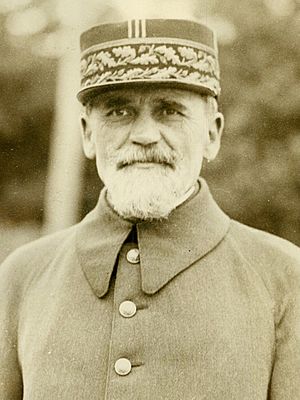Gustave-Auguste Ferrié facts for kids
Quick facts for kids
Gustave Ferrié
|
|
|---|---|

Ferrié in 1932
|
|
| Born | 19 November 1868 Saint-Michel-de-Maurienne, France
|
| Died | 16 February 1932 (aged 63) |
| Nationality | French |
| Awards | Franklin Medal (1923) IEEE Medal of Honor (1931) |
| Scientific career | |
| Fields | Electrical engineering |
Gustave-Auguste Ferrié (born November 19, 1868 – died February 16, 1932) was a French radio pioneer and an army general. He made important contributions to wireless communication, especially for military use.

Contents
Life and Work
Early Discoveries
Gustave Ferrié was born in Saint-Michel-de-Maurienne, a town in Savoie, France. He studied in Draguignan and later graduated from the École Polytechnique in 1891. After his studies, he joined the French army as an officer in the Engineers Corps. He became an expert in military telegraph services.
In 1899, Ferrié worked with Guglielmo Marconi to set up wireless communication between France and England. This was a big step for radio technology.
He shared his research on August 22, 1900, at the International Congress of Electricity in Paris. His presentation was titled "Current state and progress of wireless telegraphy."
Radio Innovations
In 1903, Ferrié invented a new type of electrolytic detector. This device helped to pick up radio signals. Other inventors like Dr. Michael I. Pupin and Professor Reginald A. Fessenden also created similar detectors around the same time.
That same year, Ferrié suggested putting antennas on the Eiffel Tower for long-distance radio communication. Under his guidance, a radio transmitter was set up in the tower. The range of the signals quickly grew from about 400 kilometers (250 miles) to 6,000 kilometers (3,700 miles) by 1908. He then developed smaller, mobile transmitters for army units to use in the field.
Role in World War I
Before and during World War I, Ferrié was in charge of the French Military Radiotelegraphy. In 1914, he led two major advancements in military radio. He helped make ground telegraphy practical by using vacuum tubes in radio receivers. These tubes made signals much stronger.
The military used a simple buzzer as a transmitter and an amplifier with a triode (a type of vacuum tube) as the receiver. By the end of the war, the French army had produced nearly 10,000 of these radio sets. These inventions were very important for communication during the war.
Later Achievements
In 1919, Ferrié was promoted to General. He continued to serve until his death, even being allowed to stay past the usual retirement age due to a special law in 1930. He became the general inspector of military telegraphy.
Ferrié received many honors for his work. In 1917, he became a Fellow of the Institute of Radio Engineers. In 1931, he was awarded the IEEE Medal of Honor. This award recognized his pioneering work in building radio communication in France and worldwide. It also honored his leadership and his efforts in organizing international cooperation in radio.
He received an honorary doctorate from Oxford University in 1919. In 1922, he became a member of the French Academy of Sciences. He was also the first president of the French National Committee of Geodesy and Geophysics (from 1920 to 1926). He led the International Scientific Radio Union (U.R.S.I.) and the International Commission on Longitudes by Radio. From 1925 to 1927, Ferrié was the president of the French astronomical society (SAF). In 1927, he received the Prix Jules Janssen, the top award from the SAF.
Gustave Ferrié passed away on February 16, 1932, in a military hospital in Paris. Just hours after his death, he was awarded the Grand Cross of the Legion of Honour, one of France's highest awards.
Today, the Espace Ferrié (Museum of Transmissions) in Cesson-Sévigné keeps his memory alive. There are also schools named "collège Ferrié" in Draguignan and in Paris.
See also
 In Spanish: Gustave Ferrié para niños
In Spanish: Gustave Ferrié para niños
- Carlos Ibáñez e Ibáñez de Ibero – 1st president of the International Committee for Weights and Measures
Sources
- Electro-Science biography
- Espace Ferrié biography (French)
- IEEE History Center biography
- "Obituary: Gustave Ferrie", The Observatory, Vol. 55, p. 117–117, 1932.
- Photographs of commemorative monuments and plaques, Paris

